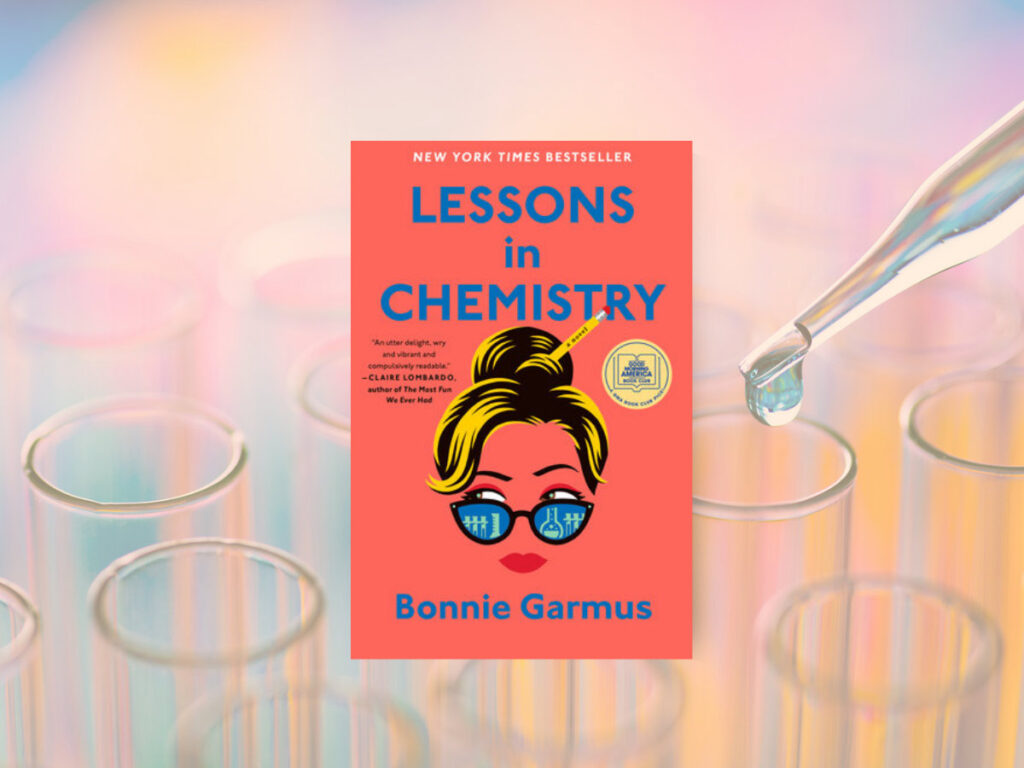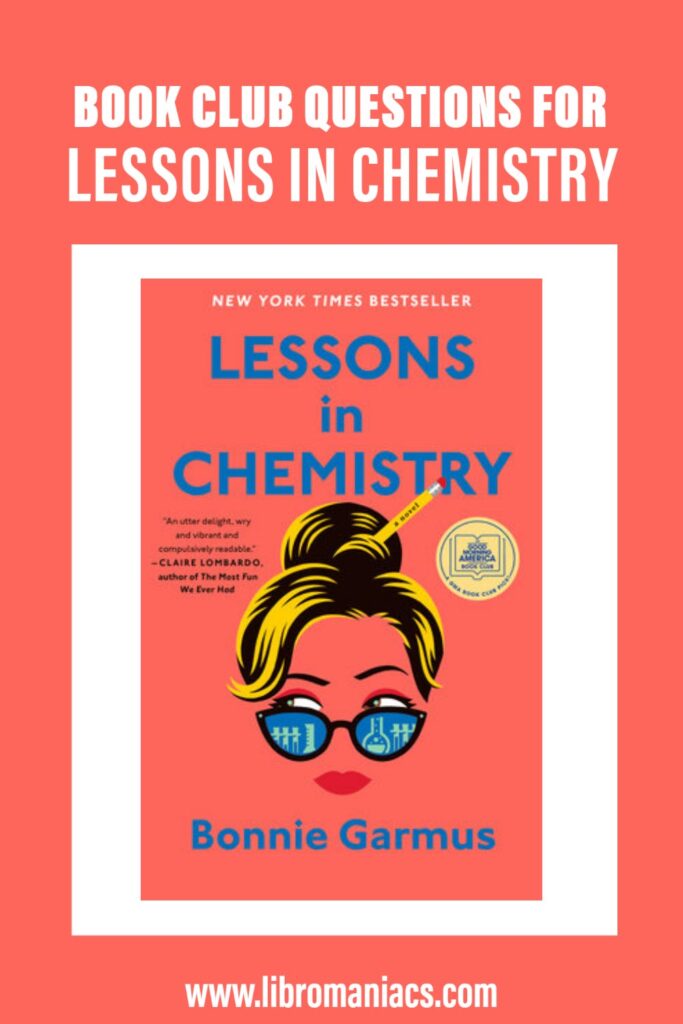Bonnie Garmus’ Elizabeth Zott is a force of nature, or rather some pretty combustible chemistry. This commanding character was on the vanguard of the 1960’s second wave of feminism, battering a thick wall of patriarchy. Elizabeth is uncompromising, fiercely loyal, and most definitely smarter than all the men in the room. She also makes a mean brownie.
The book features themes like the meaning of family (both found and lost), how sexism is ruinous, and the value of living life on your own terms.
I found the book delicious. But its up to your book club to weigh in and see if you agree. We’ve got these Lessons in Chemistry book club questions to help you get the bunson burner brewing. This discussion guide for Lessons in Chemistry features 10 book club questions along with a book synopsis (does it accurately reflect your experience of the book?) and some selected reviews (do you agree with them?)
And if you want to keep your feminist ire at peak performance, we’ve also got suggestions for three related reads.

(This article contains affiliate links. This means that if you choose to purchase, I’ll make a small commission.)
Lessons in Chemistry Synopsis
Lessons in Chemistry, Bonnie Garmus
Chemist Elizabeth Zott is not your average woman. In fact, Elizabeth Zott would be the first to point out that there is no such thing as an average woman. But it’s the early 1960s and her all-male team at Hastings Research Institute takes a very unscientific view of equality. Except for one: Calvin Evans; the lonely, brilliant, Nobel–prize nominated grudge-holder who falls in love with—of all things—her mind. True chemistry results.
But like science, life is unpredictable. Which is why a few years later Elizabeth Zott finds herself not only a single mother, but the reluctant star of America’s most beloved cooking show Supper at Six. Elizabeth’s unusual approach to cooking (“combine one tablespoon acetic acid with a pinch of sodium chloride”) proves revolutionary. But as her following grows, not everyone is happy. Because as it turns out, Elizabeth Zott isn’t just teaching women to cook. She’s daring them to change the status quo.
Laugh-out-loud funny, shrewdly observant, and studded with a dazzling cast of supporting characters, Lessons in Chemistry is as original and vibrant as its protagonist.
10 Lessons in Chemistry Book Club Questions
These questions have been tailored to this book’s specific reading experience, but if you want more ideas, we also have an article with 101 generic book club questions.
- The Life Magazine reporter was surprised by several of the audience members, who said, ”“Sometimes I think,” she said slowly, “that if a man were to spend a day being a woman in America, he wouldn’t make it past noon.” The woman on the other side of him tapped his knee. “Prepare for a revolt.””
True today? - Calvin, rather famously, vomited all over Elizabeth on what was a fetid sort of meet-cute. Do you have an equally disgusting date story?
- “There’s nothing more irritating than witnessing someone else’s unfair share of happiness, and to some of their colleagues at Hastings Research Institute, Elizabeth and Calvin had an unfair share.”
In the workplace cafeteria, this played out like a scene from Mean Girls. Why were their co-workers so jealous or unaccepting? - There is so much that Elizabeth and Calvin didn’t tell one another…wouldn’t confide…and yet they had a remarkably close relationship. Can a relationship have these gaps and still thrive?
- “@200° C/35 min = loss of one H2O per mol. sucrose; total 4 in 55 min = C24H36O18 she wrote in a notebook. “So that’s why the biscuit batter is off.” She tapped her pencil against the countertop. “Still too many water molecules.”
Have you ever used such a calculation to determine why your cake was as dry as Tuscon in August? Is your cooking more chemistry or artistry?
- Consider Mad’s family tree. It reads like a whimsical fairy tale, but it also reveals so much truth. In addition to Nefertiti and Sojourner Truth, it also includes Walter, her grandfather in prison pj’s, a grandmother eating tamales, her dead uncle and of course the acorn.
Is Mad special? Or are all kids capable of throwing down the raw truth like this? Why do adults have so much trouble doing it? - Elizabeth is so adamant about living life (and raising her child) on her own terms. How does this help her and how does it makes things more difficult?
- Please 10 minutes talking about the awesomeness of Six Thirty? How was he crucial to the story? Does your dog have a vast vocabulary?
- We’re you expecting the twist with Parker Avery at the end? Did it work for you?
- The book features a flood of sexism, unfair pay, sexual assault, and a profoundly dismissive attitude toward Elizabeth’s, Frask’s (frankly all women’s) intellect. That all sounds very 1950’s. But is it? How is some of this sexism and sexual harassment still present in today’s culture?
Selected Reviews for Lessons in Chemistry
“I’m a science dunce but it made sense to me! The dialogue is excellent, at times it’s laugh out loud funny as it’s so well phrased or the mastery of a put down or understatement. Elizabeth is quite simply fabulous, I love her and want to be her but I’ll certainly need to mug up on the chemistry!”
“I’m over quirky characters who behave as if they are on the spectrum. Why can’t we have a woman who is a brilliant chemist but isn’t naïve, socially awkward, and clueless? Except when she’s not, usually in time to deliver another monologue.”
“Bonnie Garmus has done a wonderful job in presenting an unorthodox protagonist […] I couldn’t help but laugh and cry with Elizabeth as she struggled to be the best mother and chemist she could possibly be. I’m pretty sure that this eccentric character will be one of my favorites in 2022.”
“My slight hesitation in fully recommending Lessons in Chemistry is that it deals with some very serious themes. One major scene and plot point deals with sexual assault, and I just wish it hadn’t gone allllllll the way there. I think when picking up a book like this I’m looking to escape darker reads that include violence against women. Alas, rape, lather, rinse, repeat. Sigh.”
3 Books Like Lessons in Chemistry
We’ve got a few pics listed below, but we’ve also got a whole article featuring books similar to Lessons in Chemistry that you can use to fill your TBR.
Lessons in Chemistry was recommended by the Good Morning America book club. If you like their pics, we have more guides from GMA, like The Maid, The Lions of Fifth Avenue, The Violin Conspiracy, and The Vanishing Half. And for women in unexpected roles doing science-y things, try our discussion guide for The Rose Code and other books like The Rose Code.

Florence Gordon, Brian Morton
Bring Elizabeth’s uncompromising feminism forward a few decades and you have Florence Gordon. She’s a cranky, brilliant 75-year-old feminist icon. Much to her irritation, when she finally sits down to write her memoir, family messes intrude. As do some unwanted physical ailments. But, like Elizabeth, she’s determined to carry on– on her own terms.
Of particular interest is Florence’s relationship with her granddaughter Emily. The multi-gen take on feminism was a really interesting thread throughout the storyline.

It’s Not About the Burqa: Muslim Women on Faith, Feminism, Sexuality and Race, Miriam Khan
In Anglo Western culture, the burqa is one seriously misunderstood piece of cloth. The assumed submissiveness that western culture applies to the women who choose to wear a burqa, severely diminishes Muslim women’s voices.
This essay collection aims to change that. 17 Muslim women speaking frankly about the hijab and wavering faith, about love and divorce, about feminism, queer identity, sex, and the twin threats of a disapproving community and a racist country.
The book will completely crack open any stereotypes you may have about Muslim women, and it is profoundly and surprisingly feminist.

The Personal Librarian, by Marie Benedict and Victoria Christopher Murray
Belle da Costa Green was far more than a librarian. In the ’20’s she was hired by J.P. Morgan to curate his collection of books, manuscripts and artworks, which were housed in the newly built Pierpont Morgan Library. She became a formidable collector and curator, and a captivating fixture on the New York society scene. Belle was ahead of her time, both in her position at the library, but also in her choice of lovers and her decision not to marry and have children.
In addition, Belle was hiding a secret. She was not the White woman that New York (and Morgan) saw, but rather, Belle was Black. Her family had moved to New York, hoping to pass as White in order to gain a more secure economic life.
This book is a fictionalized account of her life as an extraordinary librarian, curator, lover and “passing” person of Color at a time when it was quite dangerous to do so.
If you chose to recommend it for your book club, we also have a discussion guide for The Personal Librarian.
Have a listen on Audible. Try audio books for free for 30 days.
Share these Lessons in Chemistry book club questions with your friends:

